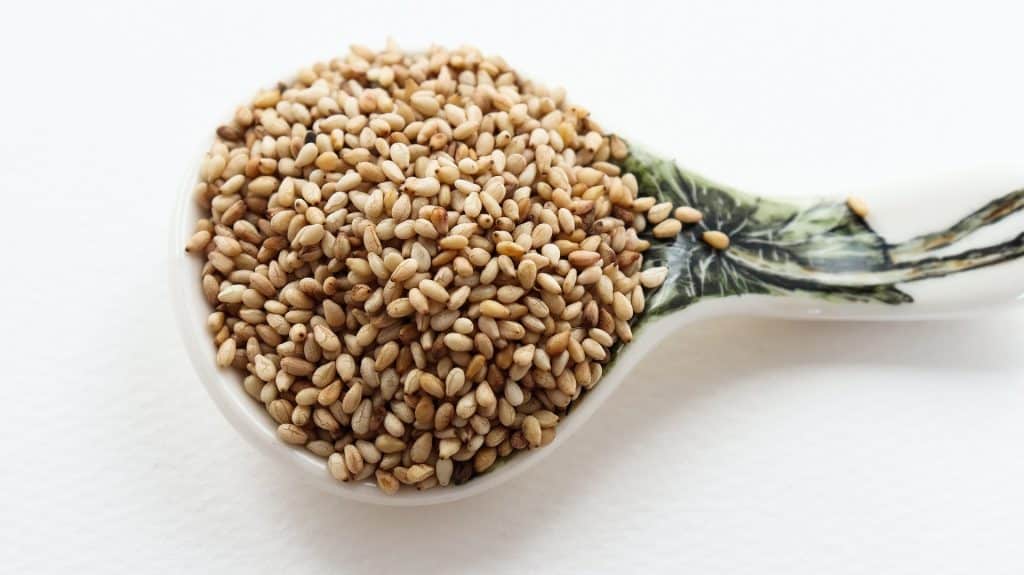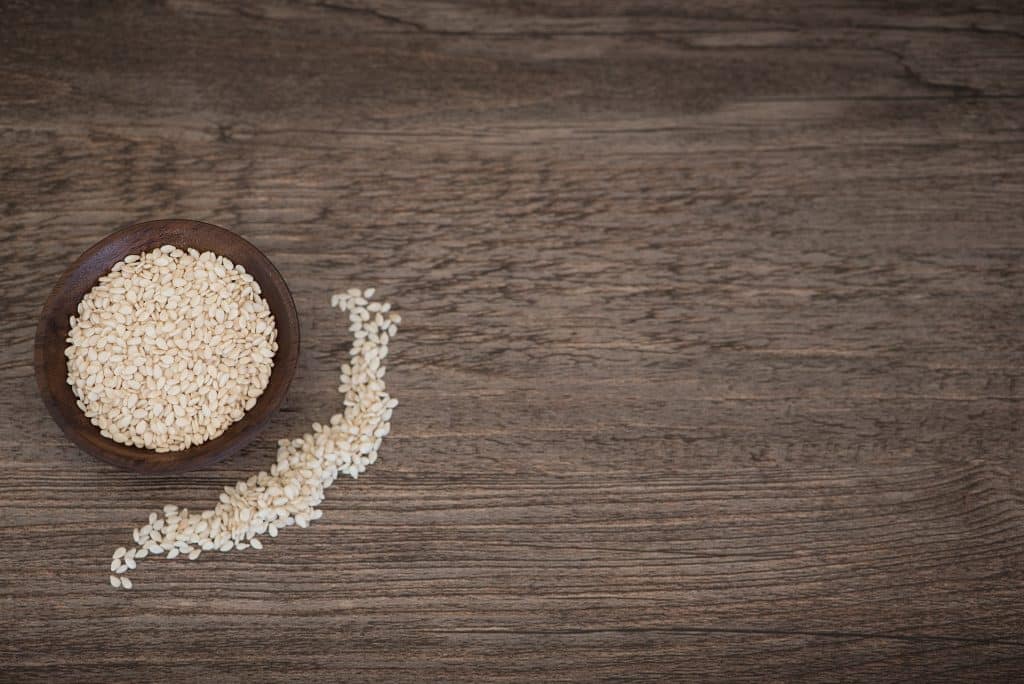Yes, you can safely feed your dog with sesame seeds, provided you offer them in moderation.
Sesame seeds are rich in calcium, phosphorous and manganese, and can help your dog with constipation. However, you should not overfeed because excessive intake results in vomiting or diarrhea for your canine friend.

Many veterinaries recommend using sesame as a dietary supplement by mixing it with other diets. Here is a complete guide on feeding dogs with sesame seeds, including the nutritional value and safe feeding tips.
Sesame Seeds Nutritional Value Facts
Sesame seeds are small, oil-rich seeds extracted from sesame flowers. Other names for sesame seeds are gingerly, sesamolna, benne seed, and benniseed.
Sesame seeds are a great source of minerals like copper and calcium, which strengthen your dog’s joints and bones. They contain fiber and other nutrients that are good for your pet’s overall health.
Here is a list of the main nutrients found in sesame seeds.
A 144g portion size of sesame seeds contains the following:
- Calories 825
- Fat 72g
- Saturated fat 10g
- Sodium 16mg
- Protein 26g
- Carbohydrates 34g
- Dietary fiber 17g
- Potassium 624mg
- Calcium 1404mg
- Iron 21mg

A typical tablespoon serving would be 9 grams, which contains less than a tenth of the above dietary values. Consult your vet expert before giving sesame seeds to your dog.
Are Sesame Seeds Safe For Dogs?
Sesame seeds are safe for dogs when given in small quantities. They are a great source of vitamins, minerals, and other nutrients which are helpful in your dog’s health.
Therefore, there’s no need to worry when your canine friend takes sesame seeds in moderation. You only need to avoid large servings to avoid upsetting your dog’s stomach due to the product’s high level of fat and fiber.
How To Safely Feed Sesame Seeds To Your Dog

Sesame seeds may not be as nutrient-dense as other dog feeds, but you can occasionally add them to your dog’s diet. Follow these few tips to get the best form of feeding sesame seeds to your dog.
Start Small
As with any other new diet for your pet, you should start with small amounts and then increase the portion with time. After the first intake, watch how your dog reacts to know whether you will continue with the diet.
A half spoon may be enough for a medium-sized dog and one spoon for an adult dog.
Consult Your Vet
Your dog may be allergic to sesame seeds depending on its breed, age, and underlying health conditions. Therefore, it is highly recommended that you consult your vet before you start feeding. Your vet may advise you on the frequency of intake and what food to mix with.
Sprinkle the Seeds on Your Dog’s Food
One great way to introduce sesame seeds to your dog is to sprinkle them on their food. Sesame seeds are rich in fiber and may help your dog with digestion.
Watch For Side Effects
Every dog reacts differently to sesame seeds, so you should be keen on your dog’s reaction. If the dog doesn’t like the seeds in their diet, stop it or use sesame oil instead. A few side effects to watch out for in your dog include:
- Diarrhea
- Vomiting
- Abnormal behavior
- Abdominal pain
Inform a vet officer or discontinue the diet once the side effects become severe.
Can Dogs Digest Sesame Seeds Easily?
The short answer is yes. Dogs can easily digest sesame seeds only if you give small amounts. Sesame seeds contain a high level of dietary fiber, which may slow down digestion when taken in large quantities.
If your dog has digestive issues, consider giving the hulled ones instead of unhulled ones. With hulled sesame, the outer covering is removed in the manufacturing process, making them soft for digestion. Unhulled have their outer cover intact and may cause absorption issues to some dogs.
Are Sesame Seeds Toxic To Dogs?
No, sesame seeds are safe for dogs when given in moderation. The seeds are tiny, so there are no chances of sticking to your dog’s teeth or choking the dog.
However, a few hazards are associated with overfeeding your dogs with sesame seeds. Below are some of them:
High-Fat Content
Sesame seeds contain high-fat content, which may disrupt your dog’s digestive process. Avoid sesame seeds or give just small amounts if your dog is allergic to high fatty content.
Allergic Reactions
Some dogs show signs of allergy after taking sesame seeds. These signs include vomiting and diarrhea, which may dehydrate your dog. Give your dog plenty of fluids when it shows dehydration after taking sesame seeds.
Stomach Pains
Dogs with digestive issues may experience constipation after overeating sesame seeds. If your dog becomes restless and shows signs of stomach upsets, inform your vet.
What Are Healthy Alternatives to Sesame Seeds in Your Dog’s Diet?
Now that you know sesame seeds are good for your furry friends, you may need to know what other alternatives you can give your dog.
Here are helpful suggestions that you can add to your dog’s diet:
The above products are all nutrient-dense and won’t negatively affect your dog.
Frequently Asked Questions
Here are the commonly asked questions about feeding your dog Sesame seeds.
My dog ate sesame seeds, what should I do?
You don’t have to worry if your furry friend takes small amounts of sesame seeds. Small pieces are easy to digest and bring nutritional benefits to your pet. Observe your dog and inform your vet if you notice side effects from excessive consumption of sesame seeds.
Can sesame seeds make my dog sick?
Yes, your dog may be uncomfortable if it takes large amounts of sesame seeds.
What seeds should dogs avoid?
Most seeds are safe for dogs. However, you should avoid apple and poppy seeds that may be toxic to your dog.
How many sesame seeds should my dog take?
Small dogs should take a maximum of ten seeds per week, while adult dogs should have a maximum of 20 seeds per week. You can increase the amount and frequency with your time if your dog doesn’t show allergic reactions.
Final Thoughts
Can dogs eat sesame seeds? Yes, these seeds are nutrient-dense, and you can occasionally sprinkle them on your dog’s food.
However, you should only feed your dog in moderation because sesame seeds are high-calorie.
If you add the seeds to your dog’s food, ensure the food does not contain spices, herbs, or salt. Prepare your dog’s food separately from the other meals of your family.
Sesame seeds can be nutritious and helpful to your dog when given in the right amounts. Remember to consult your vet before feeding for the best results.
Photo Credits:
https://pixabay.com/photos/sesami-seed-sesami-seed-korea-3985380/
https://pixabay.com/photos/sesame-sesame-seeds-seeds-key-1273402/
https://www.pexels.com/photo/man-feeding-his-dalmatian-dog-from-his-hand-5482767/



